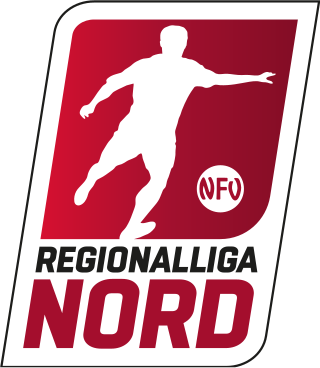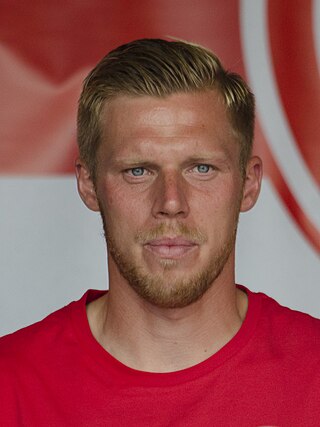Related Research Articles
The 1964–65 Bundesliga was the second season of the Bundesliga, West Germany's premier football league. It began on 22 August 1964 and ended on 15 May 1965. 1. FC Köln were the defending champions.
The 1967–68 Bundesliga was the fifth season of the Bundesliga, West Germany's premier football league. It began on 18 August 1967 and ended on 28 May 1968. Eintracht Braunschweig were the defending champions.
The 2002–03 Bundesliga was the 40th season of the Bundesliga. It began on 9 August 2002 and concluded on 24 May 2003. This was the first season where the defending champions kicked–off the opening match.
The 1995–96 Bundesliga was the 33rd season of the Bundesliga, Germany's premier football league. It began on 11 August 1995 and ended on 18 May 1996. Borussia Dortmund were the defending champions.
The 1988–89 Bundesliga was the 26th season of the Bundesliga, the premier football league in West Germany. It began on 22 July 1988 and ended on 17 June 1989. SV Werder Bremen were the defending champions.
The 1985–86 Bundesliga was the 23rd season of the Bundesliga, the premier football league in West Germany. It began on 9 August 1985 and ended on 26 April 1986. Bayern Munich were the defending champions.

The 2. Bundesliga is the second division of professional football in Germany. It was implemented 11 years after the founding of the Fußball-Bundesliga as the new second division for professional football. The 2. Bundesliga is ranked below the Bundesliga and above the 3. Liga in the German football league system. All of the 2. Bundesliga clubs take part in the DFB-Pokal, the annual German Cup competition. A total of 127 clubs have competed in the 2. Bundesliga since its foundation.

The Regionalliga Nord is the fourth tier of the German football league system in the states of Lower Saxony, Schleswig-Holstein, Bremen and Hamburg. It is one of five leagues at this level, together with the Regionalliga Bayern, Regionalliga Nordost, Regionalliga Südwest and the Regionalliga West. Until the introduction of the 3. Liga in 2008 it was the third tier.

Dieter-Klaus Hecking is a German football manager for VfL Bochum and former professional player. He played for Hannover 96 and Eintracht Braunschweig as a midfielder. He returned to manage Hannover despite the long-standing and bitter rivalry between the two clubs.

Rouwen Hennings is a German professional footballer who plays as a forward.
Jürgen Wilhelm is a German former professional footballer who played as a forward for Borussia Dortmund in the Bundesliga.
The 2010–11 season is the 101st season of competitive football in Germany.
The 2011–12 season is the 102nd season of competitive football in Germany.
1. FC Nürnberg played the 1968–69 season in the Fußball-Bundesliga.

Marvin Ducksch is a German professional footballer who plays as a striker for Bundesliga club Werder Bremen and the Germany national team.
The 1988–89 FC Bayern Munich season was the 89th season in the club's history and 24th season since promotion from Regionalliga Süd in 1965. Bayern won its tenth Bundesliga Title. This title was the fourth title in five seasons. The club reached the third round of the DFB-Pokal and the semifinals of the UEFA Cup. Several changes were made to the roster with eight players leaving via transfer or loan, including Lothar Matthäus, Andreas Brehme and Jean-Marie Pfaff. Six new players joined the club, including Olaf Thon, Stefan Reuter, Roland Grahammer, and Johnny Ekström.
The Bundesliga was founded as the top tier of German football at the start of the 1963–64 season. The following is a list of records attained in the Bundesliga since the league's inception.
The Introduction of the 2. Bundesliga was the step of establishing a professional second tier association football league in Germany in 1974. The new league, the 2. Bundesliga, played its first season in 1974–75 and continues to be the second-highest league in the country. Its introduction reduced the number of second divisions in Germany from five to two and the number of teams at this level from 83 to 40. It eliminated the necessity of having a promotion round at the end of the season to determine the two teams promoted to the Bundesliga.
The 2003–04 VfL Osnabrück season is the club's 105th season in existence and the first season back in the top flight of German football. In addition to the domestic league, VfL Osnabrück will participate in this season's edition of the DFB-Pokal. The season covers the period from 1 July 2003 to 30 June 2004.
References
- 1 2 Neuhauss, Florian (1 April 2012). "Jürgen Rynio – Rekordabsteiger und Aussteiger" (in German). Norddeutscher Rundfunk. Retrieved 21 June 2013.
- ↑ "Entstehung, Wachsen und Wirken des VfL Resse 1908 e.V." (in German). VfL Resse 1908 e.V. Retrieved 21 June 2013.
- ↑ "Jürgen Rynio" (in German). glubberer.de. Retrieved 22 June 2013.
- 1 2 Muras, Udo (14 September 2011). "Rekordabsteiger Jürgen Rynio geht unter die Autoren". Die Welt (in German). Axel Springer AG. Retrieved 22 June 2013.
- ↑ "Rynio: "Die hätten 20 Tore erzielen können"" (in German). Deutscher Fußball-Bund e.V. 12 February 2010. Retrieved 22 June 2013.
- ↑ "Die BVB Spieler-Datenbank". schwatzgelb.de – Das Borussia Dortmund Fanzine (in German). Retrieved 22 June 2013.
- ↑ "Hannover 96". kicker (in German). Olympia-Verlag. Retrieved 22 June 2013.
- ↑ "50 Jahre Bundesliga: Nushöhr und der Elfmeterhattrick" (in German). Deutscher Fußball-Bund e.V. 30 April 2013. Retrieved 22 June 2013.
- ↑ Wriedt, Christian (9 October 2011). "Zwei Spiele, zwölf Gegentore: Jürgen Rynios Negativ-Rekord". 11 Freunde (in German). Retrieved 21 June 2013.
- ↑ Risolo, Donn (2010). Soccer Stories: Anecdotes, Oddities, Lore, and Amazing Feats. University of Nebraska Press. p. 288. ISBN 0803233957.
- ↑ Lüdeke, Steffen (29 April 2008). "Vom Rekordabsteiger zum Pflegeheimleiter". Die Welt (in German). Axel Springer AG. Retrieved 22 June 2013.